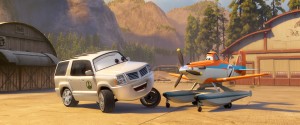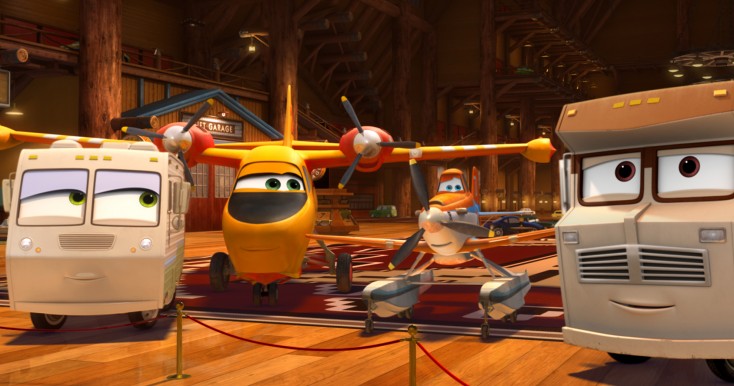
(L-R) Cad Spinner (John Michael Higgins) and Dusty (Dane Cook) in “PLANES: FIRE & RESCUE.” ©Disney Enterprises, Inc. All Rights Reserved.
By ANGELA DAWSON
Front Row Features
HOLLYWOOD—In “Planes: Fire & Rescue,” Dane Cook returns as the voice of Dusty Crophopper, the little cropduster that evolved into a winning racer in last year’s hit Disney animated movie “Planes.”
In the sequel, Dusty may have to give up racing unless a vital, hard-to-find replacement part for his engine can be found. Forced to slow down, he decides to help an aging fire truck friend keep his job by signing up for fire & rescue training near a national park. There, he makes friends with a slew of fire and rescue aircraft and ground service vehicles that are there to protect the park should a fire break out in the forest. Through intensive training followed by practical experiencing helping out in a firefight operation, he learns saving lives is just as fulfilling as racing. The sequel is directed by Bobs Gannaway based on a script by Jeffrey M. Howard, who wrote the first “Planes” script.
Cook, who is best known as a stand up comedian, recently explained why he enjoys providing the voice of Dusty, how the sequel is a completely different story than the original and how he relates to his character.
Q: It’s been almost a year. Is it exciting that you have another “Planes” coming out?
Cook: Has it been a year? It seems like a week and a half.
Q: Did you know Dusty would get fitted with pontoons?
Cook: They did tell me, like, “Dusty’s going to go through both an emotional and then a physical change.” I don’t know if I’m the only person who felt like it, but that actually got me jazzed up, because so many times in animation it’s like, “No, we gotta keep the look of the character,” and in this Dusty gets to change his color. He’s got the fire engine color towards the end, and the pontoons. I like that they allow him to not only evolve emotionally, but even physically. For me, that’s kind of wild.
Q: How does Dusty’s new look with the pontoons and inform your vocal performance?
Cook: It did. The first movie is lovely, it’s charming, it’s very sweet, and there was a certain kind of naïveté that went with Dusty. He was kind of like, “Aw, shucks,” about certain things. When he’d be dreaming about the future, especially those early scenes when he was working the field, it was always like (in a higher, breathy voice) “What if?” I just wanted to have that wonder in his voice. (again in a higher, breathy voice) “But I can do this!” Because he accomplishes his personal goal (in the last film), now he’s got self-assurance. He feels confident, so I can start the character in a completely different way. It was like approaching, in many ways, a new character. Some certain things hearken back to what we know of Dusty, but the character has definitely evolved, an he’s grown up a little bit, so that definitely changed the way I looked at him in the booth when I was in there.
Q: As a racing star, Dusty has female fans swooning over him. The Dipper character, voiced by actress Julie Bowen, is hilarious in the way she throws herself at you and thinks you two are dating.
Cook: Sure. Isn’t she great? I got to listen to all of her takes. I got to listen to most of the work of the other (voice) actors do. I’m always just so, as a fan I’m entertained, but I’m also just informed by the different ways in which they approach their characters. We (the audience) get to hear one version in the end, but I have all the different takes of her as different Julies, a tremendously talented individual, but specifically, this character. There was so much to play off of because she was so fun.
Q: Is it hard to meet someone in person that you admire?
Cook: At first. I think anytime you’re in this profession, it’s the good and the bad. Sometimes you meet people and work alongside them, and you’re just blown away by how generous they are, and sometimes you meet people who are not in the best of moods on that particular day. But I will say that working with (Julie) in that sound booth and then meeting her, and spending time with her, she’s delightful. I hope to do it again.
Q: Since you did the first “Planes,” do kids come up to you because they recognize your voice? Do they know you’re Dusty?
Cook: Yeah. It’s more their parents who may have been fans. Kids, at first, are like, “You’re not orange! And you have brown eyes! Dusty has blue eyes.” They know more about Dusty than I think they would. Usually, parents are like, “Hey, I’m a fan. (and then, to their child)He’s a comedian but you know him as Dusty,” and then I’ll do the voice. That’s kind of where I get that connection, but that experience over the past year has been like the kid inside me that used to listen to comedy albums, and then finally got to meet Bob Newhart and hear Bob Newhart’s voice talking to me.
Q: Have you incorporated your work on “Planes” into your standup act?
Cook: I did, but I had to cut it out because …
Q: Lawyers?
Cook: (He laughs.) Well, I’d tell a story, and it’s a little more adult because I’m obviously telling it in a comedy club. It was supposed to be part of my new special but I ultimately cut it because I didn’t want the people at Disney to think in any way I was saying anything disparaging. But, yeah, I’ve talked a little bit about the movie and kind of what it means to now be the voice of a character. So at some point that material will come out, but if it doesn’t, I did it. (He laughs.)
Q: How important is it to you that this film celebrates the forest service and the firefighters?
Cook: If this movie didn’t have that, it would lack a true depth. We spoke about that earlier. The heart of the film sometimes comes even without kind of hitting it on the head and saying exactly what we’re trying to do. When I read the script and when I talked to the team that was animating it, they talked so passionately about the research they did about firefighters and the jargon, and what goes into that world. And the equipment. I felt like, oh wow, this is a fun and funny adventure, but I love that at the center of it is something that is so very true, and something that people do day in and day out, that have children of their own that probably have some fear in their heart that something may happen to my mom or dad, and so to have a nice spotlight to put on courageous people, I think that’s entertainment at its best. It’s something real; something true to life and it affects us. Fun in the story and fantastical, imaginative, whatever, I think that’s the markings of great storytelling.
Q: It’s interesting that this is also about a second career for Dusty and all the other characters (at the station). Some of them were in the service or on TV or had another career before becoming part of the forest service fire and rescue. Do you think that will resonate with adults who watch this who may have had to change careers?
Cook: You start to get into that idea with looking at Dusty personally, OK. He thinks he’s set; he thinks he has career. OK? If somebody had said 10 years into my standup career, “We have enough comedians.” Imagine that, just being told that thing I worked on, and I have a pretty firm grasp on, suddenly I’m told I have to change that—and that is a reality for a lot of people—and so, I liked that message.
Q: What other thoughtful ideas does “Planes: Fire & Rescue” evoke?
Cook: There are plenty of layers in this movie, and there are plenty of heartwarming message, but right there at the beginning of this, to have Dusty say, “OK, now I need to do something brand new, but let me think of something that uses the tools that got me the acclaim and give it back to the people around me. Give it back to my community.” That’s actually my story, because once I found some success, I went through a couple of selfish years. I probably had a couple of ego years, where I was like, “Hey, I’m cool! I’m the new guy!” And when real life gets in the way, and people get sick, and things happen in your community, and you start to go back to your home town, and it’s looking a little rough, you say, “Hey, wait a minute, how can I use the attention I’m getting and deflect towards some things that are very important.” Those are my favorite conversations now to have. I have fans that come up and say, “I was part of your Comics Come Home Benefit 12 years ago. I’m one of the families that lived with cancer. You helped me be with my family during that time.” That’s what brings me the most pleasure.





